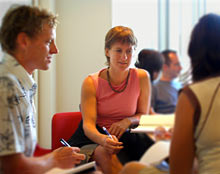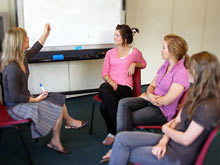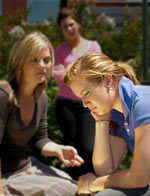 |
Building a bridge... |
Three out of every four young people with serious mental health problems do not receive any professional support (Commonwealth of Aust, 2000)
A psychological 'first-aid kit' of crisis intervention skills for teachers, youth workers, mental health professionals and teenagers.
Sadly, Australia continues to have one of the highest youth suicide rates in the developed world. Clearly services are failing to fully meet the needs of a significant number of young people from all sections of society. A major issue still facing our community is the need to detect and intervene early with young people in crisis. Neo's Dr. Simon Crisp and Emma Lund have developed an innovative crisis response intervention for those who work with young people.
We call this whole organisation approach Psychological First Response® which provides the skills and frameworks for the effective DETECTION > RESPONSE > REFERRAL of mental health, behavioural and personal safety issues of young people. Since 2002, we have trained hundreds of teachers and youth professionals across Australia. We are currently involved with Monash University to further establish the evidence-base to this innovative intervention. Training in this approach is being enthusiastically sought from some of Australia's leading independent schools, organisations and professionals that wish to provide the best support for the young people in their care.
|
|
Feedback from a recent presentation at the Victorian Institute of Teaching:
(25.2.10)
"Great content and essential for every teacher to grasp"
"(This presentation) was very educative, inspiring and motivating"
"(I gained) a better understanding of how to help and what to look for in student's mental health"
"The teacher can be the first point of contact, offering support and appropriate referral"
![]() Listen to an interview with Dr Simon Crisp
Listen to an interview with Dr Simon Crisp
(by Penny Armitage on ABC Radio)
Download an article on PFR in Outdoor Education - Outdoor Outlook Vol. 9 issue 1 2013
Three key skill areas addressed:
DETECTION > of mental health and personal risk issues,
RESPONSE > clear and simple skills in effective Psychological First Aid,
REFERRAL > supporting a young person to engage with professional help.
Neo Psychology's model of Psychological First Aid*:
|
*Caution: Only persons who have received accredited training in this model of intervention should attempt to implement it.
Types of training modules we run:
|
 |
Essentials (1 day)
[recommended for all teachers and youth workers]
- Whole-organisation approach: processes and lines of referral
- Red flags for psychological & behavioural problems
- Professionalism and mental health needs of adolescents?
- Effective detection of the ‘at-risk' adolescent
- Psychological First-Aid for common issues
- Issues and processes in effective referral to professional care
- working with parents and supporting on-going help
Advanced (2 day)
[advanced training for welfare/pastoral care teachers and youth professionals]
- Duty of care, consent, advanced confidentiality issues
- Adolescent development: the resilient adolescent – myths & facts
- Advanced risk assessment & management
- The young person's perspective
- Identifying common psychological and behavioural problems:
- Depression, suicide & self-harm
- Anxiety disorders, acute stress reactions, PTSD & adjustment disorders
- Disruptive behaviour: ADHD, oppositional behaviour & anti-social problems
- Aggression & homicidal threats
- Substance abuse
- Eating disorders
- High-risk sexual behaviour
- Sexual abuse, reporting suspected abuse or neglect, emerging personality
disorder, Asperger's syndrome - Psychiatric disorders: psychosis, bi-polar & obsessive-compulsive disorder
- Long-term management, barriers to service use & referral on
- Referring to mental health services, the Mental Health Act
- Staff self-care, de-briefing, organisational support
Psych First Response - Mental Health Professionals
- Diagnosis and formulation of risk in adolescents – individual / environmental / temporal
- Clinical risk assessment – potential for harm to self
- Clinical risk assessment – potential for harm to others
- Assessing long-term risk
- Psychological First Aid in the clinical setting
- Risk intervention and prevention strategies – individual / family / broader systems
- On-going case-management of risk
- Referral options – primary care / community support / clinical treatment
Good Mate workshop (for adolescents)[2-3 hour school-based workshops in peer psychological first aid and help-seeking]
|
 |
PsychSAFE
[Policy & procedure development consultation for schools and organisations]
- What is psychological safety?
- Why is it important that schools/organisations are safe?
- What makes a school/organisation psychologically safe?
- Whole organisation safety management systems
- Turning policy into practice
Psych First Response - Human Resource ManagersAn exciting development of the PFR model for human resources personnel to help address the psychological needs of employees. |
 |
Participant Feedback
With hundreds of participants since we started running this training in 2002, we have received excellent feedback - please request a summary of these results for more detail. Some comments received include:
"The best thing about the course was having a greater understanding of the various disorders – I am already able to apply it to certain kids and with good tips for practical application”
"Real life cases – excellent!" "Theory was excellent..." "Humor!"
"...the Psych First Response was a great help as the next week I had to counsel a quite depressed young woman and felt much more secure in the interaction, armed as I was, with
a bit of knowledge”
"The presenter was interesting and funny, good examples always help me maintain
knowledge”
"The best thing was the practicality, intimate nature and real cases..."
"The course gave me a set of procedures and guidelines that will be immediately useful for my organisation."
How to book:
We run this training in-house for schools and organisations, or as open enrolment training for teachers and youth professionals.
Contact us to discuss running this training in your school or organisation.
Email: training@neopsychology.com.au OR call: 1300 303 160



